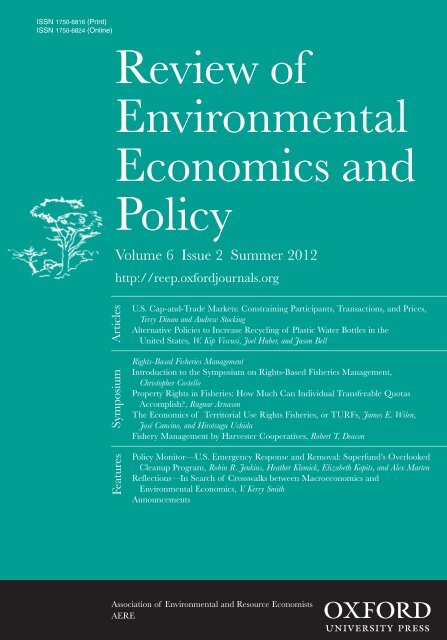The Future of Wild-Caught Fisheries: Expanding the Scope of Management
IF 6.6
3区 经济学
Q1 ECONOMICS
引用次数: 14
Abstract
In recent years, the approach to wild-caught fisheries management has expanded beyond traditional single-fishery management. This article examines potential market failures within the fisheries sector that may arise because of a failure to account for key features of wild-caught fisheries and that can be addressed by an expanded scope. These market failures include multiple species caught together, multiple fisheries targeting the same stock, and other ecological and socioeconomic interconnections within ecosystems. We also examine market failures that may arise when external factors such as climate change and species invasions are not considered in fisheries management policy or if policies do not consider multisector use of seascapes, linkages between water pollution and fisheries, and market failures that cut across fisheries and nonfishery sectors and involve the underprovision of publicly available data and a lack of information sharing along the supply chain. We find that policies that address these market failures typically have distributional effects; that is, there will be winners and losers, even if aggregate efficiency increases. We conclude that research and policy design need to explicitly consider equity-efficiency trade-offs when seeking to address market failures, and we propose policy and research priorities that support the sustainability of wild-caught seafood.野生捕捞业的未来:扩大管理范围
近年来,野生捕捞渔业管理的方法已经超越了传统的单一渔业管理。本文探讨了渔业部门内部潜在的市场失灵,这种失灵可能是由于未能考虑到野生捕捞渔业的关键特征而产生的,可以通过扩大范围来解决。这些市场失灵包括同时捕获多个物种,针对同一种群的多种渔业,以及生态系统内的其他生态和社会经济相互联系。我们还研究了在渔业管理政策中没有考虑气候变化和物种入侵等外部因素时可能出现的市场失灵,或者如果政策没有考虑海景的多部门利用,水污染与渔业之间的联系,以及跨越渔业和非渔业部门的市场失灵,以及涉及公共可用数据提供不足和供应链上缺乏信息共享时可能出现的市场失灵。我们发现,解决这些市场失灵的政策通常具有分配效应;也就是说,即使总效率提高,也会有赢家和输家。我们的结论是,在寻求解决市场失灵时,研究和政策设计需要明确考虑公平-效率权衡,我们提出了支持野生捕捞海产品可持续性的政策和研究重点。
本文章由计算机程序翻译,如有差异,请以英文原文为准。
求助全文
约1分钟内获得全文
求助全文
来源期刊
CiteScore
10.80
自引率
0.00%
发文量
25
期刊介绍:
The Review of Environmental Economics and Policy fills the gap between traditional academic journals and the general interest press by providing a widely accessible yet scholarly source for the latest thinking on environmental economics and related policy. The Review publishes symposia, articles, and regular features that contribute to one or more of the following goals: •to identify and synthesize lessons learned from recent and ongoing environmental economics research; •to provide economic analysis of environmental policy issues; •to promote the sharing of ideas and perspectives among the various sub-fields of environmental economics;

 求助内容:
求助内容: 应助结果提醒方式:
应助结果提醒方式:


